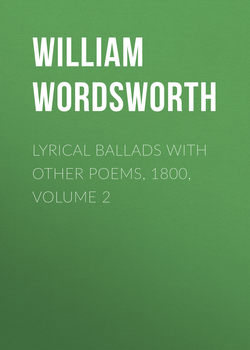Читать книгу Lyrical Ballads with Other Poems, 1800, Volume 2 - William Wordsworth - Страница 2
HART-LEAP WELL
PART SECOND
ОглавлениеThe moving accident is not my trade.
To curl the blood I have no ready arts;
'Tis my delight, alone in summer shade,
To pipe a simple song to thinking hearts,
As I from Hawes to Richmond did repair,
It chanc'd that I saw standing in a dell
Three aspins at three corners of a square,
And one, not four yards distant, near a well.
What this imported I could ill divine,
And, pulling now the rein my horse to stop,
I saw three pillars standing in a line,
The last stone pillar on a dark hill-top.
The trees were grey, with neither arms nor head;
Half-wasted the square mound of tawny green;
So that you just might say, as then I said,
"Here in old time the hand of man has been."
I look'd upon the hills both far and near;
More doleful place did never eye survey;
It seem'd as if the spring-time came not here,
And Nature here were willing to decay.
I stood in various thoughts and fancies lost,
When one who was in Shepherd's garb attir'd,
Came up the hollow. Him did I accost,
And what this place might be I then inquir'd.
The Shepherd stopp'd, and that same story told
Which in my former rhyme I have rehears'd.
"A jolly place," said he, "in times of old,
But something ails it now; the spot is curs'd."
You see these lifeless stumps of aspin wood,
Some say that they are beeches, others elms,
These were the Bower; and here a Mansion stood,
The finest palace of a hundred realms.
The arbour does its own condition tell,
You see the stones, the fountain, and the stream,
But as to the great Lodge, you might as well
Hunt half a day for a forgotten dream.
There's neither dog nor heifer, horse nor sheep,
Will wet his lips within that cup of stone;
And, oftentimes, when all are fast asleep,
This water doth send forth a dolorous groan.
Some say that here a murder has been done,
And blood cries out for blood: but, for my part,
I've guess'd, when I've been sitting in the sun,
That it was all for that unhappy Hart.
What thoughts must through the creature's brain have pass'd!
To this place from the stone upon the steep
Are but three bounds, and look, Sir, at this last!
O Master! it has been a cruel leap.
For thirteen hours he ran a desperate race;
And in my simple mind we cannot tell
What cause the Hart might have to love this place,
And come and make his death-bed near the well.
Here on the grass perhaps asleep he sank,
Lull'd by this fountain in the summer-tide;
This water was perhaps the first he drank
When he had wander'd from his mother's side.
In April here beneath the scented thorn
He heard the birds their morning carols sing,
And he, perhaps, for aught we know, was born
Not half a furlong from that self-same spring.
But now here's neither grass nor pleasant shade;
The sun on drearier hollow never shone:
So will it be, as I have often said,
Till trees, and stones, and fountain all are gone.
Grey-headed Shepherd, thou hast spoken well;
Small difference lies between thy creed and mine;
This beast not unobserv'd by Nature fell,
His death was mourn'd by sympathy divine.
The Being, that is in the clouds and air,
That is in the green leaves among the groves.
Maintains a deep and reverential care
For them the quiet creatures whom he loves.
The Pleasure-house is dust: – behind, before,
This, is no common waste, no common gloom;
But Nature, in due course of time, once more
Shall here put on her beauty and her bloom.
She leaves these objects to a slow decay
That what we are, and have been, may be known;
But, at the coming of the milder day,
These monuments shall all be overgrown.
One lesson, Shepherd, let us two divide,
Taught both by what she shews, and what conceals,
Never to blend our pleasure or our pride
With sorrow of the meanest thing that feels.
